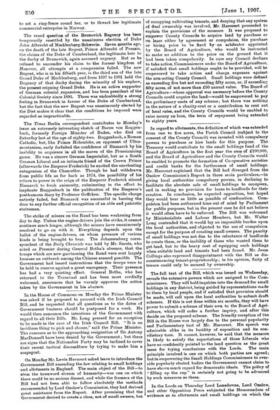On Monday Mr. Lewis Harcourt asked leave to introduce the
Government Bill amending the law relating to small holdings and allotments in England. The main object of the Bill—to stern the townward stream of humanity—was one on which there could be no serious dissent, and while the framers of the Bill had not been able to follow absolutely the methods recommended by Lord Onslow's Commission, they had derived great assistance from the Report. After premising that the Government desired to create a clam, not of small owners, but
of occupying cultivating tenants, and denying that any system of dual ownership was involved, Mr. Harcourt proceeded to explain the provisions of the measure. It was proposed to empower County Councils to acquire land by purchase or on lease either by agreement or compulsion, the purchase or hiring price to be fixed by an arbitrator appointed by the Board of Agriculture, who would be instructed to make no addition to the price on the ground that it bad been taken compulsorily. In case any Council declines to take action, Commissioners under the Board of Agriculture, if satisfied that small holdings ought to be provided, will be empowered to take action and charge expenses against the non-acting County Council. Small holdings were defined as exceeding five but not exceeding fifty acres, or, if exceeding fifty acres, of Ilot more than £50 annual value. The Board of Agriculture—whose approval was necessary before the County Councils could acquire the land—would be empowered to pay the preliminary costa of any scheme; but there was nothing in the nature of a charity-rent or a contribution to rent out of local rates, and the County Councils would be enabled to raise money on loan, the term of repayment being extended to eighty years.






































 Previous page
Previous page